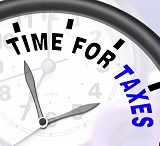The IRS takes the distinction very seriously.
Many small businesses start out as casual pastimes. You help troubleshoot your friends’ computer problems in your spare time, and they start telling their friends and business contacts about you. Or you use your woodworking skills to build furniture for non-profit organizations or your sewing skills to make one-of-a-kind dolls for the neighbor kids.
 Word gets around that you’re good at what you do, but you can’t keep doing it for free. You have to start charging for your time in addition to the materials required.
Word gets around that you’re good at what you do, but you can’t keep doing it for free. You have to start charging for your time in addition to the materials required.
There’s a point at which the Internal Revenue Service would consider you a business, obligating you to report your income and expenses on IRS forms and schedules come tax-filing time. So how do you know when you reach that point?
A Good Problem
If you’re in such a situation, whether you’re trying to parlay something you produce into a full-time business or you’re just doing it in your free time, ask yourself nine questions. This is a bit of a gray area, but the IRS looks at a number of factors in order to determine your status.
- Do you conduct yourself in a businesslike manner?
- Do your time and effort imply that you’re trying to make your related activities profitable?
- Is the income you bring in necessary for your livelihood?
- Are your losses the result of events that are out of your control, or are they normal losses that occur when a business is launched?
- Do you alter your production or service methods to try to be more profitable?
- Do you – or anyone else involved in the enterprise – have the skills and knowledge required to make your business a success?
- Have you ever made a profit creating similar products?
- Are you making a profit — some years, at least? How much?
- Do you anticipate continuing to make a profit in the future, based on what you’re producing?
The IRS does not consider just one of these factors when determining whether or not you need to file. Nor is its decision based solely on your answers to these nine questions.
It’s an all-or-nothing deal. You can’t claim deductions on your tax return for what the IRS calls an activity not engaged in for profit. In other words, you can’t deduct any expenses you incur for participating in a sport, hobby or other recreational activity unless you’re filing as a sole proprietor or small business. And if you file as a sole proprietor or small business, you also have to deal with the other side of the equation and pay taxes on any income you receive.
A Smart Beginning
If you’ve reached the point where you’re thinking you’d like to take on the legal obligations of being a business as well as participate in the benefits of such a venture, give us a call. You’ll have to make decisions about how to run the business, such as the tax structure of your enterprise, for example. You’ll be filing additional IRS documents, and you’ll need to start estimating your quarterly payments in order to avoid paying an unanticipated tax bill on April 15.
All of this may sound a little daunting, but we can walk you through the steps necessary to launch a new business venture. It takes some work at the start and as you continue to meet your IRS-related responsibilities. But you’ll also have the satisfaction of knowing that you’ve finessed a hobby, skill, or interest into a legitimate, successful business.

